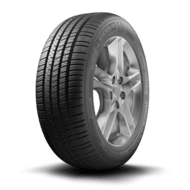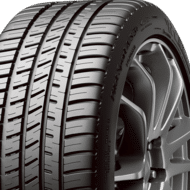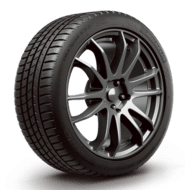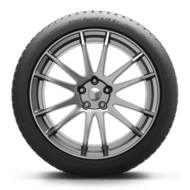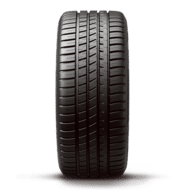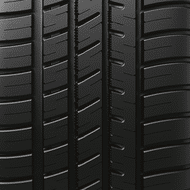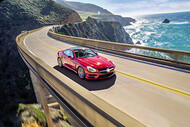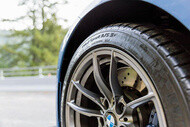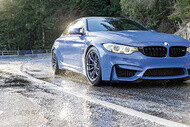(1) IMPORTANT: While all-season tires are designed to provide reliable performance in moderate winter conditions, the use of four winter tires is recommended for optimal performance and may be mandatory in certain jurisdictions.
(1) Based on internal dry braking tests from 96 km/h versus the Continental® ExtremeContact™ DW tire size 225/45ZR17, using a 2015 BMW 328i. Actual on-road results may vary.
(2) Based on internal braking tests from 80 km/h (wet braking) and 96 km/h (dry braking) versus the Bridgestone® Potenza™ RE970AS Pole Position™, Continental® ExtremeContact™ DWS06, Pirelli® P ZERO™ ALL SEASON Plus, Goodyear® Eagle® F1 Asymmetric All-Season, Hankook ventus S1 noble2, and Yokohama® ADVAN Sport® A/S tires in size 225/45ZR17, using a 2015 BMW 328i. Actual on-road results may vary.
(3) Based on third-party snow traction tests using ASTM Test Method F1805-12 in tire size 215/45ZR18 93Y. Actual on-road results may vary.
(4) IMPORTANT: While all-season tires are designed to provide reliable performance in moderate winter conditions, the use of four winter tires is recommended for optimal performance and may be mandatory in certain jurisdictions.
OE [Vehicle Manufacturer] Sidewall Marking: N0 = Porsche
OE Code [Original Equipment Key]: POR = Porsche
Figures on chart represent estimated calculations.
XL = Extra Load
ZP = Zero Pressure Run-Flat Technology
>> The sizes shown are average design values for tires measured on specified measuring rim widths. Some tires may vary from this value by +/-3% of the section height (affecting overall diameter), and +/-4% of the section width.
>> Section width varies approximately 0.2" (5mm) for every 0.5" change in rim width.
>> Tread patterns are often tuned to accomodate different tire widths. Tires for a particular dimension of a given tireline may vary in appearance from the tire shown in the photograph.
WARNING: Serious or fatal injury may result from tire failure due to underinflation or overloading. To ensure correct air pressure and vehicle load, refer to vehicle owner's manual or tire information placard on the vehicle. Serious injury or death may result from explosion of tire/rim assembly due to improper mounting. Only tire professionals should mount tires and they should never inflate beyond 40 psi to seat the beads. Before mixing types of tires in any configuration on any vehicle, be sure to check the vehicle owner's manual for its recommendations.
DANGER: Never mount a 16" diameter tire on a 16.5" rim. Never mount a 17" diameter tire on a 17.5" rim.
Inflation pressure increase must not exceed the maximum pressure branded on the tire sidewall. When a customer requests a replacement tire with a lower speed rating than the original equipment tire, you must clearly communicate to him or her that the handling of the vehicle may be different, and that its maximum speed capability is limited to that of the lowest speed-rated tire on the vehicle. Exceeding the lawful speed limit is neither recommended nor endorsed.
Michelin North America (Canada) Inc. does not endorse the operation of any vehicle in an unsafe or unlawful manner. Exceeding the safe, legal speed limit is neither recommended nor endorsed.
For high-speed driving, additional inflation pressure and possibly reduced tire loading and/or upsizing is required. In the absence of specific recommendations by the vehicle manufacturer, use the following guidelines based on those in the European Tyre and Rim Technical Organization Standards Manual.
For speeds over 160km/h (100 mph), load and inflation must be adjusted according to the table below.
W-Speed Rated Sizes:
Maximum Speed (km/h) 190 200 209 219 230 240 249 259 270
Inflation Increase (psi) 0 1.5 3.0 4.5 6.0 7.5 7.5 7.5 7.5
Load Capacity (% of max) 100 100 100 100 100 100 95 90 85
Y-Speed Rated Sizes:
Maximum Speed (km/h) 190 200 209 219 230 240 249 259 270 280 290 299
Inflation Increase (psi) 0 0 0 0 1.5 3 4.5 6 7.5 7.5 7.5 7.5
Load Capacity (% of max) 100 100 100 100 100 100 100 100 100 95 90 85
IMPORTANT: While all-season tires are designed to provide reliable performance in moderate winter conditions, the use of four winter tires is recommended for optimal performance and may be mandatory in certain jurisdictions.






